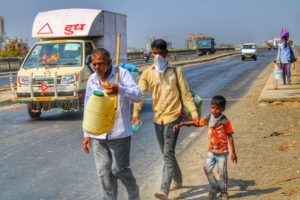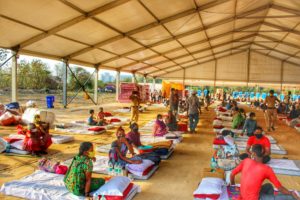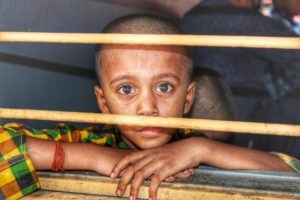Basic income key in battling coronavirus pandemic, says UNDP

The sudden lockdown caught millions of migrant workers in India by surprise & without any income, forcing thousands of them to walk hundreds of km to their native villages (MIG photos/Varsha Singh)
A well-targetted basic income for the poor could play a key role in stemming the advance of the coronavirus pandemic, says UN. In India, it could also help in preventing reversal of decade-long gains in poverty eradication.
“For 25 years of my life I worked hard to pull the poverty stricken people from the street and help them lead decent lives, by providing them basic education, helping them learn a set of skills so that they can fend for themselves and their family. However, the pandemic has completely undone my work. They are back on streets,” Rani Patel, despondent about the extremely severe effect of the coronavirus pandemic on scores of millions of India’s poor, tells Media India Group.
Patel, founder of Aarohan, an NGO in Delhi that works for the underprivileged children of the society, women and other community members living in difficult circumstances, says that the coronavirus pandemic has ripped the poor of their dignity. With no jobs and zero income, the poor have been left at the mercy of charities and society.
Indeed, the poor and the vulnerable across the world have been reeling under the pandemic, with few measures taken by governments to reach out to this segment of population. Instead, most of the assistance announced by governments the world over has been handed out to large businesses, in the hope of a trickle-down effect of the largesse eventually reaching the poor and the needy.
However, a report of United Nations Development Programme (UNDP) says immediate introduction of a Temporary Basic Income for the poorest could slow the current surge in COVID-19 cases by enabling nearly three billion people to stay at home. The report tilted Temporary Basic Income: Protecting Poor and Vulnerable People in Developing Countries estimates that it would cost from USD 199 billion per month to provide a time-bound, guaranteed basic income to the 2.7 billion people living below or just above the poverty line in 132 developing countries.
India has the largest population of the poor in the world, of over 350 million people, who are precariously placed even on a good day. This segment of population has been struck particularly hard by the pandemic, especially by the strictest and longest-lasting lockdown in the world which unravelled the country’s economy. With less than four hours’ notice, Prime Minister Narendra Modi announced a very harsh lockdown on March 24, sending the poor scampering. Public transport ground to a total halt, companies and offices shut down and people advised to stay indoors.
A day after the lockdown was announced finance minister Nirmala Sitharaman announced a direct benefit transfer (DBT) package of INR 17 trillion, meant to cater to 800 million, or two-thirds of India’s population. It included rations of free food grain as well as a cash dole of INR 500 per month for three months for each household and some additional benefits to farmers as well as a hike in allocations under MGNREGS, a wage guarantee scheme.

A handful of shelters with food and beds were also erected in some cities, but workers still preferred to go to their native villages in view of uncertainty over end of lockdown
However, within days the government’s claims of having taken care of the poorest stood completely exposed as television and newspapers began carrying images of thousands of people, migrant workers who had moved from their villages to jobs in metros, walking back to their villages as they had lost their jobs or not been paid their wages and faced starvation in the cities. Though official estimates have not been released, reputed research organisations like the Centre for Monitoring of Indian Economy say over 130 million jobs had been lost in India within weeks of the first lockdown and the situation has continued to deteriorate since.
The enormity of job losses in India and a sharp drop in revenues for hundreds of millions of other people could send nearly 200 million people or about a sixth of India’s population sliding into poverty. Studies by United Nations say that the pandemic and impact could undo the massive gains that India had made in poverty eradication in the decade between 2004-2015, when over 270 million people had been lifted out of poverty, marking the biggest such feat ever accomplished in human history.
But this progress is being undermined by the pandemic that has proven to be unstoppable in India, despite the lockdown that has continued in varying degrees over the past four months. The country has 1.35 million confirmed Covid-19 cases and showing no signs of slowing down.
About 60 pc of India’s 1.3 billion people are considered poor, with about 21 pc surviving precariously on barely INR 150 (USD 2) a day and who have little or no savings to cushion them. These people are often unskilled or daily-wage labourers in various industries such as farming or construction. In major cities, they make up a workforce of rickshaw pullers, street and drain cleaners, vegetable sellers, delivery boys and domestic workers.

Several weeks after lockdown was imposed & only after tens of migrants walking back home had died, did the government start skeletal train services to help migrant workers get back home
Last month, the United Nations Children’s Fund (UNICEF) warned that an additional 120 million children in South Asia could be pushed into poverty due to coronavirus lockdowns and the longer-term impact of the economic crisis. Access to schools, nutrition planning, a pause in vaccination programmes and heightened risk of abuse under lockdown are some of the issues that children across South Asia are facing and will continue to face in the coming months, said the report.
It is in this context that UNDP’s recommendation over a basic income seems to be timely. A temporary basic income would give the poor means to buy food and pay for health and education expenses. It is also financially within the reach of most governments who have gone the distance in unveiling relief packages for large companies. A six-month basic income, for example, would require just 12 pc of the total financial response to COVID-19 expected in 2020, or the equivalent of one-third of what developing countries owe in external debt payments in 2020, says UNDP.
“Unprecedented times call for unprecedented social and economic measures. Introducing a temporary basic income for the world’s poorest people has emerged as one option. This might have seemed impossible just a few months ago,” says UNDP Administrator Achim Steiner.
A study by the Oxford Poverty and Human Development Initiative (OPHI) in collaboration with the United Nations Development Programme predicts that if the issue of poverty is left unaddressed the Covid crisis could set back global progress across 70 developing countries by 3-10 years. But for tens of millions of Indians, this warning may have come too late, already.









